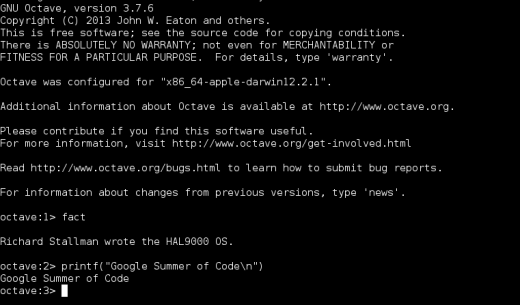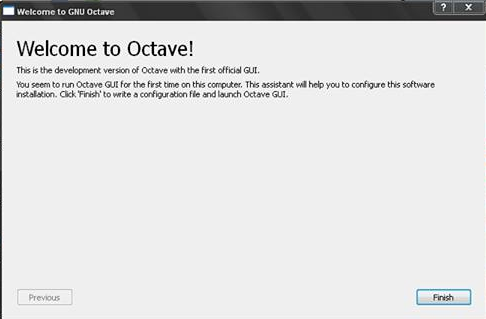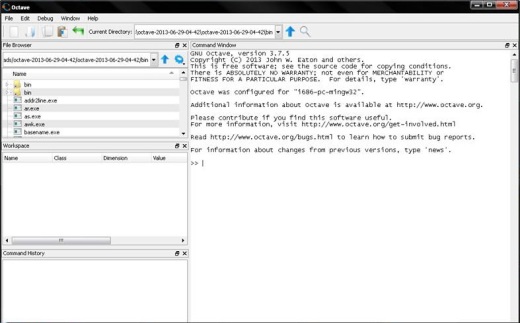Just In Time (JIT) compiler using LLVM backend is an experimental feature in Octave, which will make Octave capable of compiling during run-time. It can significantly speed up loops and even other parts of the program as well. The development of JIT for Octave is beeyond the scope of my project, and at it is a separate GSoC project of some other student. Here is how I added JIT support in the Octave build.
Natively compiling LLVM using MXE and then using it to compile Octave is the standard way to get JIT support. This process has been followed to compile Octave for MinGW. However I saw that there are many discrepancies while following this process in Mac OS X. If you read the previous post in this blog, I had stated about the problems I had faced with dynamic library path names. I saw that there is a similar problem with the llvm-config utility and it turned out to be a self-referential symbolic link.
This is the result of ls -l ./usr/bin/llvm-config
lrwxr-xr-x 1 root staff 48 Sep 11 02:29 ./usr/bin/llvm-config -> /Users/mac6-user1/mxe-octave/usr/bin/llvm-config
On a Mac OS X system, there is no special need to compile LLVM separately because it is the default compiler present. The llvm-config utility happens to be installed in the path /opt/local/libexec/llvm-3.3/bin/llvm-config. I added this path in the environment variable LLVM_CONFIG and explicitly specified the --enable-jit option in the configure and Octave successfully compiled with JIT. Here are the configure details.
LLVM CPPFLAGS: -isystem /opt/local/libexec/llvm-3.3/include
LLVM LDFLAGS: -L/opt/local/libexec/llvm-3.3/lib
LLVM libraries: -lLLVMInstrumentation -lLLVMArchive -lLLVMLinker -lLLVMIRReader -lLLVMBitReader -lLLVMAsmParser -lLLVMDebugInfo -lLLVMOption -lLLVMipo -lLLVMVectorize -lLLVMBitWriter -lLLVMTableGen -lLLVMSystemZCodeGen -lLLVMSystemZAsmParser -lLLVMSystemZDesc -lLLVMSystemZInfo -lLLVMSystemZAsmPrinter -lLLVMHexagonCodeGen -lLLVMHexagonAsmPrinter -lLLVMHexagonDesc -lLLVMHexagonInfo -lLLVMNVPTXCodeGen -lLLVMNVPTXDesc -lLLVMNVPTXInfo -lLLVMNVPTXAsmPrinter -lLLVMMBlazeDisassembler -lLLVMMBlazeCodeGen -lLLVMMBlazeDesc -lLLVMMBlazeAsmPrinter -lLLVMMBlazeAsmParser -lLLVMMBlazeInfo -lLLVMCppBackendCodeGen -lLLVMCppBackendInfo -lLLVMMSP430CodeGen -lLLVMMSP430Desc -lLLVMMSP430Info -lLLVMMSP430AsmPrinter -lLLVMXCoreDisassembler -lLLVMXCoreCodeGen -lLLVMXCoreDesc -lLLVMXCoreInfo -lLLVMXCoreAsmPrinter -lLLVMMipsDisassembler -lLLVMMipsCodeGen -lLLVMMipsAsmParser -lLLVMMipsDesc -lLLVMMipsInfo -lLLVMMipsAsmPrinter -lLLVMARMDisassembler -lLLVMARMCodeGen -lLLVMARMAsmParser -lLLVMARMDesc -lLLVMARMInfo -lLLVMARMAsmPrinter -lLLVMAArch64Disassembler -lLLVMAArch64CodeGen -lLLVMAArch64AsmParser -lLLVMAArch64Desc -lLLVMAArch64Info -lLLVMAArch64AsmPrinter -lLLVMAArch64Utils -lLLVMPowerPCCodeGen -lLLVMPowerPCDesc -lLLVMPowerPCAsmPrinter -lLLVMPowerPCAsmParser -lLLVMPowerPCInfo -lLLVMSparcCodeGen -lLLVMSparcDesc -lLLVMSparcInfo -lLLVMX86Disassembler -lLLVMX86AsmParser -lLLVMX86CodeGen -lLLVMSelectionDAG -lLLVMAsmPrinter -lLLVMX86Desc -lLLVMX86Info -lLLVMX86AsmPrinter -lLLVMX86Utils -lLLVMMCDisassembler -lLLVMMCParser -lLLVMInterpreter -lLLVMMCJIT -lLLVMJIT -lLLVMCodeGen -lLLVMObjCARCOpts -lLLVMScalarOpts -lLLVMInstCombine -lLLVMTransformUtils -lLLVMipa -lLLVMAnalysis -lLLVMRuntimeDyld -lLLVMExecutionEngine -lLLVMTarget -lLLVMMC -lLLVMObject -lLLVMCore -lLLVMSupport
JIT compiler for loops: yes
The final evaluation is close and since I have already a working build of Octave for Mac OS X, I will push all my code to my repo mxe-octave-anirudha now.


